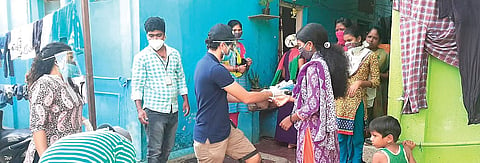

MYSURU: Post the lockdown, many things took a backseat or came to a standstill, but despite the constraints, these young women are ensuring that hygiene and awareness are given priority.
Dedicated to addressing menstrual health issues during the COVID-19 pandemic, Dr Sagarika Nithyanand (28) and Manasa Rao (24), volunteers with non-profit Reachout India, are distributing sanitary products to women in slums and also hosting awareness sessions.
After the first round of distribution, they found that several daily wage/migrant workers were reusing disposable sanitary pads, shedding light on the abysmal living conditions of women during the pandemic. The volunteers then put together menstrual hygiene kits comprising sanitary pads (7), soaps and hand sanitizers for women migrant/daily wage workers.
What started off as a 1,000-kit distribution project in Mysuru, turned into a massive outreach programme, with 10,000 kits being distributed in the city, thanks to the "overwhelming support from the local community", the volunteers say. The largest distribution drive was in Bharatnagar slum, where door-to-door distribution of kits was done.
A team of 15 volunteers from different lines of work who have been taking part in the distribution drives, are packing the kits, and also raising the money (each kit costs Rs 60) for the kits via crowd funding. The team also wants to set up dustbins specifically for sanitary waste across Mysuru. The duo has visited 16 slums and 40 low-income areas in Mysuru in the last two months, and has reached out to 7,500 women.
Dr Sagarika, who does one-on-one consultations with the women, says, “In many slums, we found out that there were no proper waste disposal mechanisms and that women often resorted to burning, burying or flushing. Many women also reuse menstrual products. We are planning to make presentations in high schools to educate girls about menstrual hygiene.”
Manasa, a lawyer and development practitioner, says, "We are happy to have met over 10,000 women in the last two months and discussed common menstrual problems with them, which is otherwise a taboo. We hope our initiative will help these women have a comfortable period."
She added, "An average woman may use 7-12 pads a month, costing around Rs 70. Those who can’t afford pads every month follow traditional methods such as using cloth. If these are not cleaned properly, it could lead to serious infections. We are also planning on training a team of women on how to make their own sanitary napkins with the help of experts."
Their plan is to introduce a menstrual hygiene manual for local government schools to use as part of their curriculum through Reachout’s ‘Project Rise’. They have been relying on ground support from slum associations, local corporators and other organisations such as Sri Sthanakvasi Jain Yuva Samaj and Swami Vivekananda Youth Movement.
Funds are also being generated using social media and word of mouth. Speaking about how the initiative has helped, Sameena Jabeen from KSCB Colony Kalyangiri, says that getting the kits during the lockdown has been a boon as it had become difficult for women to buy sanitary napkins.